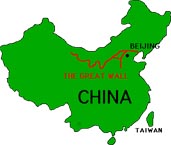China thirsts under drought, water waste
 Beijing - It is not just the worst drought in five decades that makes China reel under under water insufficiency.
Beijing - It is not just the worst drought in five decades that makes China reel under under water insufficiency.
Too many people in the world's most populous country are consuming rapidly diminishing water resources at an accelerating pace. Utter waste, together with inefficient use of water reserves exacerbate the crisis.
Chinese and foreign experts have been sounding the alarm for considerable time as rivers and lakes dry out and ground water levels fall, while climate change causes glaciers to melt at an ever faster pace.
At the same time, water pollution is worsening dramatically.
"China faces a major challenge in managing its scarce water resources to sustain economic growth in the years ahead. This is a daunting task," said the World Bank's recent Cost of Pollution in China study.
The water crisis is already costing China about 2.3 per cent of its gross domestic product, according to a World Bank estimate.
More than 300 million people in the countryside have no access to clean and safe drinking water, diseases like cancer and diarrhea are on the rise among children.
Some 400 of China's 660 largest cities lack sufficient water supplies, with the situation being particularly bad in metropolises like Beijing and Tianjin.
Beijing has had no rain for more than 100 days, with 15 provinces suffering from the worst drought in decades this winter.
Many cities and towns have declared a state of emergency as the harvest on 10 million hectares of farm land is endangered.
"It looks pretty serious," said Lester Brown of the Earth Policy Institute in Washington, DC.
He added the winter wheat harvest, which accounts for 90 per cent of the country's entire harvest, would definitely be down from last year. Brown said he had seen studies ranging from 2 to 20 per cent less.
"If it is close to 20 per cent, then China will likely be coming into the world market for wheat imports," he said.
The result would be higher prices along with an exacerbation of the global food crisis.
But China not only has to tackle the current drought, but also long-term general water scarcity.
With just 7 per cent of the world's fresh water reserves at its disposal the country has to supply 20 per cent of the global population.
As four fifths of these reserves are concentrated in the south, northern China is in a particularly bad position, although the region harbours two thirds of all farmed land, which must be irrigated.
Almost all of the water needed for irrigation is pumped up through wells.
As a result of this excessive pumping, the ground water level in the Hai river basin has subsided between 50 and 90 metres, in Beijing even by between 100 to 300 metres.
"On the one hand we have drought and insufficient drinking water, on the other an incredible waste of existing resources," criticized China's deputy minister for water management, E Jingping.
The sorry state of irrigation systems results in only 45 per cent of the pumped water actually reaching the fields.
China's agricultural industry consumes two thirds of all water available, although the sector contributed only one eighth to the country's GDP, explained the minister.
And demand by farmers is poised to rise another 60 per cent by 2030, according to experts.
Even China's manufacturing industry consumes between three and 10 times the amount of water than its counterparts in developed countries.
Only some 40 per cent of industrial waste water is treated, while western countries manage treating between 75 and 85 per cent.
The country's average, including human sewage treatment, accounts for just 56 per cent.
In addition, increasing water contamination and pollution through chemical fertilizers, pesticides and livestock waste is difficult to control.
But despite the apparent crisis, the 1.3 billion Chinese are still wasting water as if it would be inexhaustible.
One of the reasons for this thoughtlessness is the antiquated water distribution scheme introduced by the Communists, which makes water extremely cheap.
Because of that, the World Bank recommended a radical reform of water management practices in China including the adoption of water saving technologies and behavior, an adjustment of water prices, a clear definition of water ownership rights, and tougher environmental protection laws.
"Water prices need to be allowed to rise to reflect its full scarcity value," recommended the World Bank study.
"The first step is for water and sewerage prices to at least cover the financial needs of the water supply and sewerage enterprises," the report added. (dpa)